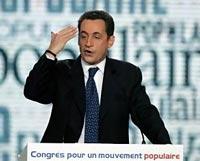French electorate tempers 'blue wave'

Nicolas Sarkozy's Union pour un Movement Populaire (UMP) has secured a parliamentary majority but the much predicted ‘blue wave' did not materialise. Although the centre-right candidate won the presidential election by over 6 per cent of the vote, his parliamentary power was tempered by the 185 seats the electorate handed to the Socialist party.
The UMP won 314 seats in the 577 seat assembly and has now claimed to have a mandate to implement its key policies. These include raising VAT to fund healthcare, tighter (selective) immigration controls, a reduction in taxes, an increase in mandatory jail terms and offering French Universities more autonomy. Sarkozy is also adamant that he will continue to oppose Turkish membership of the EU.
However, it is clear that due to the recent elections the National Assembly will not be the marauding vehicle the UMP had hoped for and as a result such widespread reform may prove difficult.
Voter turnout was low at 60 per cent but it seemed to constitute a return to the general feelings of 2004, which saw the regional councils dominated by the Parti Socialiste. There is widespread division in France as to whether or not this result was a success for the Socialist Party or merely a reflection of the reluctance on behalf of the population to give Sarkozy a free reign. Talk was widespread that people were voting against Sarkozy as oppose to registering support for the socialist candidate. He has been categorized with Jean-Marie Le Pen in some quarters whilst other commentators praise his work ethic and willingness to make a departure from the ruling elite. The former mayor of Neuilly (a suburb in Paris) is a controversial figure, a pragmatist as opposed to an ideologist. The son of a Hungarian immigrant with an abrasive style and love of the spotlight he has been championed as much needed young blood in the EU, but he could yet prove to be a Gaullist obstructionalist.
Sarkozy has already talked of restrictions to be placed on new EU members with a low rate of tax, propounded the need to protect Europe from foreign competition and controversially oversaw the State funded rescue mission of French power generation and transport company, Alstom. It may have been Sarkozy who, in his capacity as Minister for the Interior, suggested a ‘mini-treaty' to replace the constitution rejected by France and the Netherlands whilst advocating increased sovereignty for the EU, but his attempts to speed up the implementation of an EU Constitution will not be without conditions. It is thought he will pursue this course of action if he can be guaranteed that boundaries will exclude Turkey, a nation which he has vehemently maintained should not be granted EU membership.
The Socialist Party can claim some credit for calming the waters of the blue wave. They highlighted the rise of VAT as a central election issue and warned voters against transferring too much power to a right-wing entity led by a perceived egotistical maverick, the result saw far less assembly seats then the 501 some predicted for the UMP. Leader Francoise Hollande must, in private at least, be dusting himself down after a successful damage control exercise.
The truth however remains that the party failed to offer a substantial manifesto to the electorate and allowed Sarkozy to appear as a new departure from the Chirac period of which he was part. The party showed a degree of contempt for its support by patronizing the youth and working class, calling publicly upon them to vote.
But vote for what? Reactionary measures to the manifesto of Sarkozy? It is hard to see the party as it stands make any meaningful gains from five years in opposition. Hollande has talked of a providing a meaningful voice in the assembly and ensuring a balance to democracy. But as one battle has ended he must now face another, an attritional internal maelstrom that may have long term implications for the party.
Hollande's long term partner Segolene Royal, party colleague and defeated presidential candidate, announced that the long standing couple are to split. This is seen by many to be the first step to a leadership contest. During the presidential election Royal stated that she was disappointed by the level of support afforded to her by the party. The division within the ranks is apparent. Some members feel that Hollande cost the popular Royal the Presidency, but many have stated that Royal was to blame for the defeat and subsequent loss of confidence in the left. Her public attempts to court MoDem, the new centrist party of Francois Bayrou, attracted as much criticism as support with many citing it as a statement of weakness or the raising of a white flag.
It remains to be seen if Sarkozy can unify France and restore it to the top of the EU table, but the foreseeable future of France seems to be in the hands of his party. It was the third successive defeat for the French left in the quest for Presidential office, and although it could yet see the emergence of a new leader, it is unlikely that the much needed blood letting will be followed by a swift recovery.
